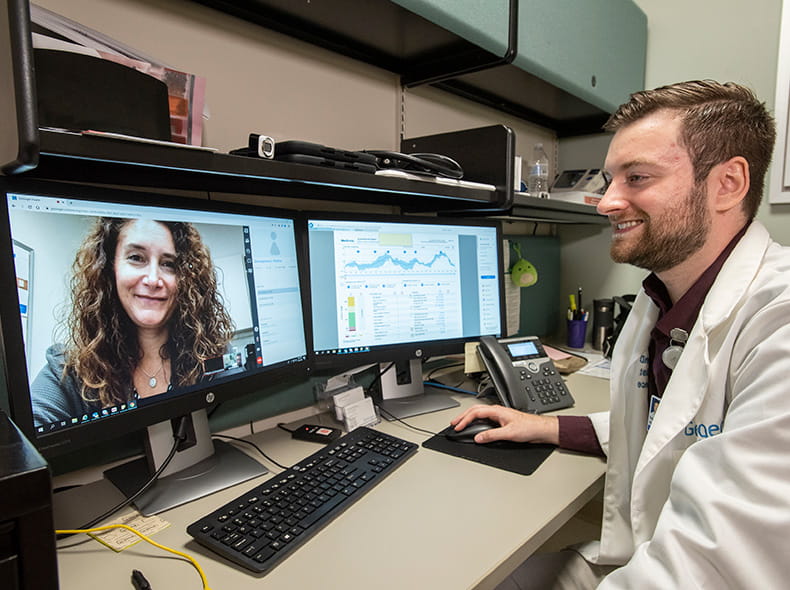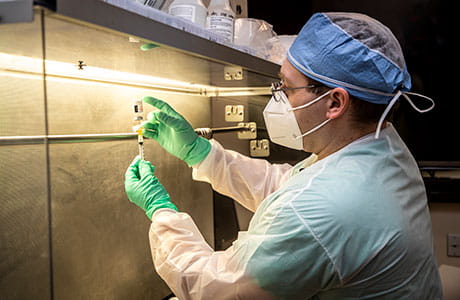
Master’s of Genetic Counseling degree
Hands-on learning with diverse counselors and patients.
Genetic counseling program



The program is not currently enrolling students.
A message from Program Director Lindsay Bailey Payne, MS, CGC
Geisinger’s Master’s of Genetic Counseling immerses you in the field of genetic counseling in a healthcare system that values genetics and genomics integration into healthcare. Alongside an ever-growing team of genetic counselors and genetics professionals, you'll take part in expansive clinical and research opportunities.
The genetic counseling workforce has been consistently expanding and as more genetic counselors enter the workforce in traditional and non-traditional roles, our goal is to provide you with an education that allows you to pursue the genetic counseling career path of your choosing.


About us
The Master’s of Genetic Counseling program at Geisinger College of Health Sciences is a 21-month program in Scranton, Pa., designed to expose students to a wide breadth of experiences to foster their professional growth on the path to becoming a genetic counselor. Geisinger students receive didactic education through lectures and active learning modules. Hands-on experiences start in the first semester of training with simulated cases and fieldwork observations. Geisinger is a learning healthcare system that focuses on precision medicine with genetics at the forefront. Genetic counselor faculty have roles in clinic, research, laboratory, insurance and administration and are available for mentorship during your education.

Our mission
Our mission is to recruit and educate people who are passionate about the field of genetic counseling, recognize the importance of health equity, and who strive for excellence and innovation to better serve our community. As a leader in genetics, Geisinger aims to train thought leaders who can continue the integration of genetics knowledge and resources into our medical community and beyond.

Our goals
Promote the development of autonomous genetic counselors to provide leadership in the genomic era of medicine through enhanced education centered around precision medicine.
Promote the principles of diversity, equity, inclusion, and justice and their importance to healthcare providers, healthcare systems, and the communities that they serve.
Educate individuals on human and medical genetics, as well as psychosocial skills to utilize their comprehensive genetic counseling skill set to care for and educate the diverse needs and backgrounds of the communities that are served.
Prioritize hands-on clinical experience to promote classroom-based objectives and develop critical thinking practices applied in all areas of the profession.

Hands-on research
The MyCode Genomic Screening and Counseling program analyzes patient-provided DNA samples and shares health findings with patients and genetic counselors.
Genetic counseling program overview
Fall
Research Methods I - 1
Genetic Counseling Seminar series - 1
Foundations of Genetic Counseling I - 3
Foundations of Genetic Counseling I: Lab
Medical Genetic I: Embryology - 2
Introduction to Clinical Genetics - 3
Human Molecular Genetics - 3
Epidemiology and Statistical Methods - 2
Genetic Counseling Fieldwork - 1
Spring
Research Methods II - 1
Genetic Counseling Seminar series - 1
Foundations of Genetic Counseling II - 3
Medical Genetics II - 2
Genomic Testing and Variant Interpretation - 3
Advanced Clinical Genetics Specialties - 3
Genetic Counseling Fieldwork - 2
Case approach to Genetic Counseling - 2
Genetic Counseling Fieldwork - 5
Fall
Research Methods IV - 2
Genetic Counseling Seminar series - 1
Foundations of Genetic Counseling III - 3
Precision and Public Health I - 3
Biomedical Ethics - 3
Professional Issues I -1
Genetic Counseling Fieldwork - 3
Spring
Research Methods V - 2
Genetic Counseling Seminar series - 1
Genetic Counseling Fieldwork - 4
Precision and Public Health II - 2
Professional Issues II - 1
Course descriptions
This course follows Introduction to Clinical Genetics Specialties and occurs concurrently with Medical Genetics II. In the context of genetic counselor professional evidence-based practice guidelines, Advanced Clinical Genetics Specialties will further explore reproductive, cancer, and cardiovascular genetics topics as well as understand the role of genetics in neurodevelopmental and neuropsychiatric conditions.
Through a team-based learning approach, students will understand the role of a genetic counselor and genetic testing in facilitating the evaluation and diagnosis of genetic diseases in a multidisciplinary team. Students will describe the process for managing a case in the context of various genetic counseling specialties, as well as the medical, psychosocial, emotional and familial aspects to management of common genetic diseases.
This course will cover the basics of defining a research topic and how to develop the best possible experimental design for a hypothesis. Researchers will present on their research topics and provide guidance on selecting a research question.
A course focused on research will be offered 5 times throughout the 2 years. This course is meant to educate and foster learning within the research environment.
This course will involve a more in-depth discussion on qualitative research projects, reacting to a qualitative research boot camp, and prioritizing IRB protocol submissions with related supplementary materials.
A course focused on research will be offered 5 times throughout the 2 years. This short, six-week course is meant to assist students with finalizing their thesis study protocols before submission.
Fieldwork
- Clinical observations begin in the first semester. Students are expected to take part in observational rotations in the first semester. In the spring semester of the first year, students begin participatory rotations for a total of seven rotations. Other experiences include supplemental experiences, as students are required to take part in one supplementary experience per semester.
- Fieldwork rotations are offered at Geisinger, with opportunities in Forty-Fort and Danville, as well as remote rotations. Other rotation sites include surrounding hospitals in the community, including WellSpan Health, Lehigh Valley Hospital, Hershey Medical Center and UPMC.
Genetic counseling program requirements
Applicants to the Master’s of Genetic Counseling must meet the following minimum requirements:

Coursework prerequisites
-
• Statistics (minimum 3 credits)
• Behavioral science (psychology preferred but other social science accepted) (minimum 6 credits)
• Genetics (course with significant genetics exposure, for example: developmental genetics; genomics) (minimum 3 credits)
• Biochemistry (minimum 3 credits)
• 2 Additional upper-level science courses (i.e. biology, chemistry, embryology, anatomy, physiology)

Required experiences
Students should have experience observing and/or using skills relevant to counseling. Students are not required to have one specific experience or observation but should comment in their essay about how their experiences share relevance with their desire to pursue a career in genetic counseling (e.g., camp counselor, medical assistant, genetic counseling assistant, other counseling position).

Other relevant experiences
Related positions or volunteer work in healthcare, research, laboratory.

Required materials
Personal statement; Minimum of 3 letters of recommendation, including 1 from undergraduate training, and 1 from a healthcare professional.
- Year one: 43,555, plus applicable fees
- Summer: 12,645, plus applicable fees
- Year two: 37,935, plus applicable fees
- Board exam pass rate – not yet available
- Attrition rate – not yet available
- Job placement rate – not yet available
- Accreditation status – program is in currently in candidacy status, and is seeking accreditation. The program is currently not enrolling.
- Institutional services – Student Life

